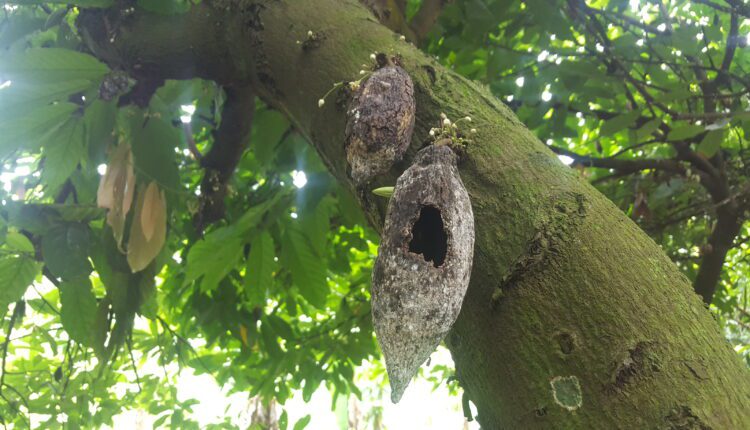Black Pod Outbreak Following Rains Could Dampen Ghana’s Harvest
Cocoa farmers request urgent help to combat fungal disease
A raging incidence of the black pod disease is threatening cocoa crop yield over large swathes of farms across cocoa-producing regions in Ghana.
The outbreak, farmers told Cocoa Post is spreading at an alarming rate exacerbated by heavy and continuous rains in recent weeks.
“Talk to every farmer in this country, and they will tell you that farms that have not even seen black pod for some decades now, this year we have seen black pod in our farms,” revealed Ismail Pomasi, a cocoa farmer in the Ashanti Region.
“The more pressing issue at the moment is the black pod attack on our farms. As we speak now about 20-30% of our pods have been seriously attacked my black pod, which we just have to remove from the trees,” explained Pomasi.
Ghana faces its lowest crop output in the last half-decade due to a long spell of Harmattan winds, the Cocoa Swollen Shoot Virus Disease (CSSVD), and the destruction of cocoa farms by illegal gold mining activities.
Fears are that the current wave of black pod outbreak if not contained could deal another hefty blow to the already difficult cocoa production situation in the country.
Pomasi noted that as a result of the black pod outbreak “Pods that we have controlled right from May up to this time, they’ve almost reached their maturity stage and we are removing them out.”
According to him, farmers are doing their best to follow through with safety protocols, adding “So if you go and detect that it is there, you have to just remove them, dig and bury them – that’s the best practice.”
To curb the risk of having the whole tree or entire farm affected there is a need for timely chemical application in line with good agronomic practices.
“But the problem we have now is that we do not have fungicide in the system. Even where available, they are so expensive that the farmer cannot buy,” indicated Pomasi, whose farm is situated in the Ahafo Ano South District of Ashanti.
In the Western North Region, cocoa farmers reported the widespread incidence of the fungal disease pointing to too much rainfall.
A cocoa farmer based in Sefwi Bekwai, Issifu Issaka, confirmed the incidence of the black pod disease on his farm and explained that “Yes because of the massive rain we are all witnessing same.”
The Cocoa Health and Extension Division (CHED) of the Ghana Cocoa Board, the sector regulator, has been offering continuous training to farmers on disease prevention and control practices, including the appropriate application of agrochemicals.
While that knowledge comes in handy at a time like this, concerns are that the current rainfall pattern being experienced isn’t helping the situation.
“As you go to the farm you are applying and it’s raining and it’s washing away the chemical you are spraying on the pod,” observed Pomasi.
“It’s the continuous rains – it has been raining almost every day. For the past two months now, it will not go beyond two days that we don’t experience rain. I know the nature of black pod is that it deals with the humid, so once we don’t have the sunshine, we don’t have enough ventilation and it continues to rain it can easily spread.”
The farmers believe the scale of the disease demands an urgent and immediate intervention by the regulator deploying the full capacity of its spraying gangs to action.
“Either than that this year the targets that we are trying to get it will really go down,” Ismail Pomasi, the Ahafo Ano South cocoa farmer warned, adding that “The black pod disease is such that sometimes within 3 or 5 days the entire farm can be affected. So we need to really look at it.”
Ghana’s neighbour and the world’s leading producer of cocoa beans, Ivory Coast, was reported by Reuters news agency on Monday as experiencing a similar challenge with black pod due to heavy rains in the last few months.
- Illegal Mining Threatening Ghana’s $230M Cocoa Rehabilitation - April 10, 2024
- Ghana Raises Cocoa Farmgate Price by 58.26% to GHC2,070 per bag - April 5, 2024
- New Standard for Measuring Cocoa Household Income Launched - April 5, 2024
